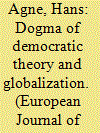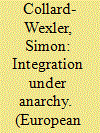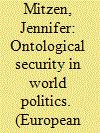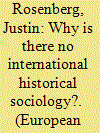|
|
|
Sort Order |
|
|
|
Items / Page
|
|
|
|
|
|
|
| Srl | Item |
| 1 |
ID:
073835


|
|
|
|
|
| Publication |
2006.
|
| Summary/Abstract |
This article examines and questions a principle in democratic theory which has become particularly fashionable in analyses of globalization and European integration, namely that everyone affected by a decision should be able to participate in making it. It is found that this principle is too strong to fit with the meaning of democracy, leads to tautological arguments, is indeterminate in politically important cases and, if its indeterminacy is rectified, fails to support ideas of political equality and accountability. Removing this principle from the concept of democracy implies, among other things, that empirical analysis becomes more significant, indeed necessary, for assessment of effects of globalization on democracy. Parallel to the development of critical arguments is the defence of a theoretical alternative according to which the delimitation of democratic communities should be decided on the grounds of what effect it produces in terms of autonomy for everyone, those included as well as those excluded.
|
|
|
|
|
|
|
|
|
|
|
|
|
|
|
|
| 2 |
ID:
073834


|
|
|
|
|
| Publication |
2006.
|
| Summary/Abstract |
The process of integration and the pacification of Western Europe can be seen as one of the most significant developments in international relations at the turn of the century. Yet the European Union (EU) remains under-theorized and neglected in the neorealist canon. This article explains the difficulty of neorealism at explaining the EU. At a historical level, the breadth and depth of European integration challenge neorealist predictions regarding sustained cooperation, relative gains, interdependence, international institutions, balance of power, and bandwagoning. At a systemic level, the EU manifests anomalous forms of mixed hierarchy and functional differentiation. Neorealist attempts to develop auxiliary theories to account for the anomalies created by the EU has created a degenerative research program that is either incomplete, logically flawed, or empirically false. This article concludes by pinpointing the failure of neorealism, proposing theoretical renovations, and drawing policy implications.
|
|
|
|
|
|
|
|
|
|
|
|
|
|
|
|
| 3 |
ID:
073833


|
|
|
|
|
| Publication |
2006.
|
| Summary/Abstract |
This article purports to explain why the concept of global civil society recently has attracted so much interest within academic and political discourse. Given the ambiguity and apparent incoherence of this concept, its centrality within contemporary International Relations and political theory is puzzling. The article argues that once we pay attention to the function of the concept of domestic civil society within different historical contexts, we are better able to understand the logic governing the usage of global civil society as well. Much like its domestic antecedents, theories of global civil society provide answers to the question of how to govern effectively, in this case by constituting the global realm as a sphere of governmental activity, as well as by justifying the exercise of authority within this emergent sphere. The article concludes by discussing the ethical implications of the concept of global civil society, disputing its emancipatory potential.
|
|
|
|
|
|
|
|
|
|
|
|
|
|
|
|
| 4 |
ID:
073832


|
|
|
|
|
| Publication |
2006.
|
| Summary/Abstract |
This article proposes that in addition to physical security, states also seek ontological security, or security of the self. Ontological security is achieved by routinizing relationships with significant others, and actors therefore become attached to those relationships. Like its physical counterpart, the ontological security motive is a constant. But states may adhere to routines rigidly or reflexively, and variation in attachment style has implications for security-seeking. This article conceptualizes the individual-level need for ontological security, scales it up to states, and applies the ontological security-seeking assumption to the security dilemma. Realists argue that states want to escape security dilemmas but uncertainty prevents them. Ontological security-seeking suggests that states may not want to escape dilemmatic conflict. Because even dangerous routines provide ontological security, rational security-seekers could become attached to conflict. Ontological security-seeking sheds new light on seemingly irrational conflict, and suggests lines of research into the stability of other outcomes in world politics.
|
|
|
|
|
|
|
|
|
|
|
|
|
|
|
|
| 5 |
ID:
073831


|
|
|
|
|
| Publication |
2006.
|
| Summary/Abstract |
Historical sociological studies in IR face a challenge similar to that discussed by Martin Wight in 'Why is There no International Theory?' Classical social theorists conceptualized 'society' in the ontological singular, leaving their successors with a 'domestic analogy' problem which has dogged attempts to provide a social theory of International Relations. Overcoming this problem requires an expansion of the premises of social theory to incorporate those general features of social reality which generate the phenomenon of 'the international'. This expansion can be achieved using Leon Trotsky's idea of 'uneven and combined development'. Specifically, the existence of 'the international' arises ultimately from the 'unevenness' of human sociohistorical existence; its distinctive characteristics can be derived from analysis of the resultant condition of 'combined development'; and its significance, thus sociologically redefined, entails a reconceptualization of 'development' itself - one which removes the source of the 'domestic analogy' problem for historical sociology.
|
|
|
|
|
|
|
|
|
|
|
|
|
|
|
|
|
|
|
|
|